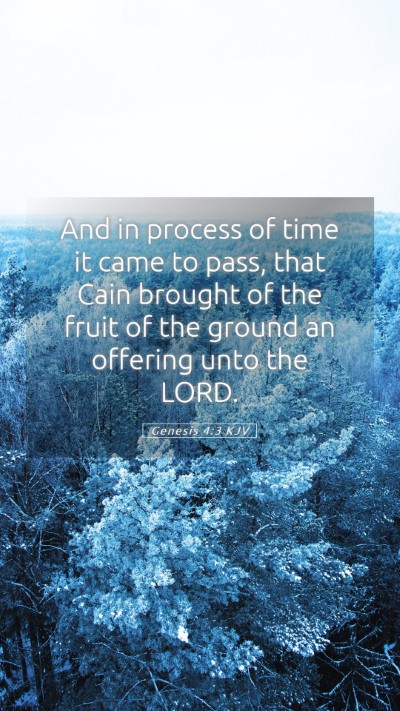Understanding Genesis 4:3
Genesis 4:3 states, "And in the process of time it came to pass that Cain brought of the fruit of the ground an offering unto the Lord." This verse marks a significant moment in the early narrative of humanity, showcasing the beginnings of worship and sacrifice to God. Below, we will explore the in-depth interpretations, historical context, and implications of this verse using insights drawn from notable public domain commentaries.
Meaning and Interpretation
This verse introduces Cain’s offering and sets the stage for the ensuing drama between Cain and Abel. The action of bringing an offering is integral to understanding early worship practices and the significance of sacrifice in the relationship between God and humanity.
Bible Verse Meanings
-
Matthew Henry's Commentary:
Henry emphasizes the personal nature of offerings, indicating that Cain's act of bringing fruit reflects his recognition of God's authority and a desire to express gratitude. However, the details of his offering suggest that it might not have been with the right heart or intention.
-
Albert Barnes' Commentary:
Barnes highlights the idea that Cain’s offering was a crucial act of devotion. However, the manner in which he presented his offering foreshadows the later narrative of jealousy and despair, hinting that God’s favor is not guaranteed by the act alone, but by the attitude behind it.
-
Adam Clarke's Commentary:
Clarke suggests that while Cain’s offering was sincere, it lacked the blood sacrifice that Abel would later present. This omission signifies a deeper spiritual truth regarding the nature of acceptable worship. Clarke notes the importance of the firstlings of the flock in Abel’s offering, contrasting it with Cain's fruits of the ground.
Historical Context
Understanding this passage demands an awareness of the ancient Near Eastern culture, in which sacrifices were common practices in both personal and communal worship. The act of offering was closely tied to both agricultural and pastoral life. This context allows for a deeper exploration of why offerings held such significance:
- Worship was a communal act, aiming to restore and maintain relationships between humanity and the divine.
- Both brothers brought what they had: Cain, a farmer, presented fruits, while Abel, a shepherd, offered a lamb.
- God’s preference for one offering over the other introduces themes of grace, acceptance, and the conditions of worship that resonate throughout Scripture.
Insights on Worship and Sacrifice
The passage invites reflection on the quality of one’s offerings to God. Several lessons emerge regarding sincerity of heart, faith in action, and the expectation of divine acceptance:
- **Sincerity in Giving:** The intent behind an offering is paramount; God examines the heart rather than just the act.
- **Faithful Responsibility:** Each individual's background and skills contribute to their form of worship, implying diversity in how people relate to God.
- **Divine Favor:** God’s favor is not simply on the offering itself but on the relational dynamic it fosters between the giver and the Divine.
Application in Daily Life
As we look to apply this verse in our daily lives, consider the following takeaways:
- **Self-Reflection:** Examine your motivations for giving, whether in resources, time, or talents. Are they offered joyfully and out of love for God?
- **Valuing Relationships:** Nurture sincere relationships with God and others that reflect genuine intentions and the spirit of worship.
- **Diversity of Offerings:** Recognize and celebrate the different ways people express their faith and devotion.
Cross References
This verse can be understood in light of several other scriptures that illuminate the themes of offering and worship:
- Hebrews 11:4 - "By faith Abel offered unto God a more excellent sacrifice than Cain." This verse highlights the faith aspect behind Abel's offering.
- 1 Samuel 16:7 - "For the Lord seeth not as man seeth; for man looketh on the outward appearance, but the Lord looketh on the heart." This emphasizes God's focus on the heart behind the offering.
- Malachi 1:6-8 - These verses critique blemished offerings and speaks to the importance of honoring God in how we worship.
Conclusion
In exploring Genesis 4:3, we not only uncover the layers of biblical meaning but are also encouraged to engage deeply in our worship practices. By aligning our offerings with our heart's intent, recognizing God’s preferences, and valuing diverse expressions of faith, we draw closer to understanding the essence of worship.
This analysis serves as a foundational piece for anyone delving into Bible verse meanings, seeking to unravel Bible verse interpretations, or looking for Bible study insights on how to apply these teachings into their lives. Through this understanding, we can participate in the ongoing conversation of faith, community, and worship.


